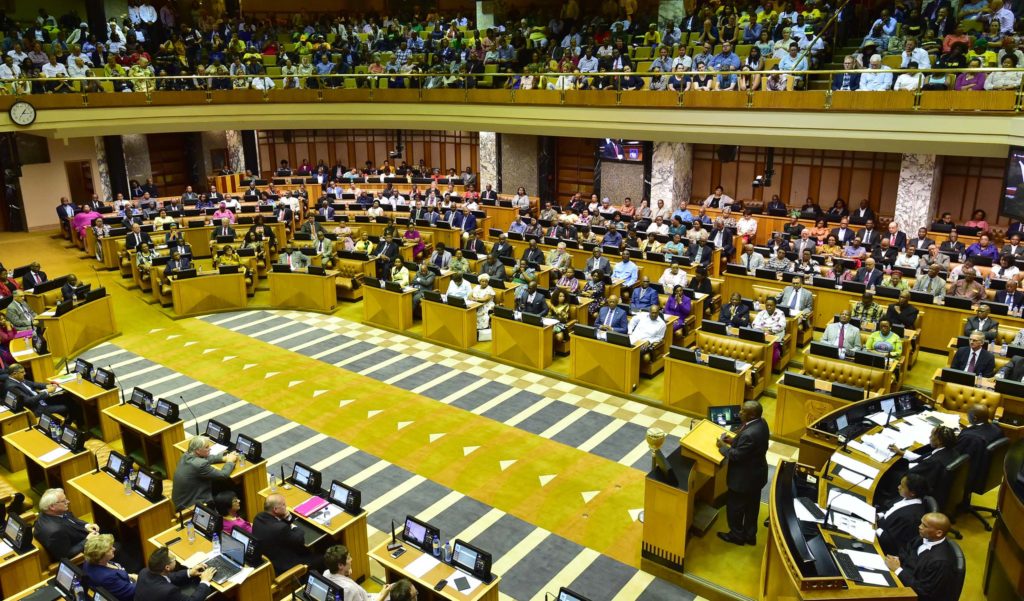INSIGHTS • EVANGELIZATION

Bringing The Good News Into Public Life
BY MIKE POTHIER | PROGRAMME MANAGER, SACBC PARLIAMENTARY LIAISON OFFICE
WHEN ONE thinks of evangelization, the spreading of the Good News, Parliament is perhaps not the first thought that comes to mind. Most people probably associate it more with bad news—endless political bickering, dishonest politicians insulting each other, and corruption of all kinds.
Maybe it is precisely because of the place’s poor reputation that we should think of it as in need of evangelization. Almost 25 years ago, when the Catholic Parliamentary Liaison Office (CPLO) was established by our bishops, they certainly saw Parliament as a site falling within the Church’s broader mission—but in a special way.
CPLO has never had a specifically spiritual or religious mandate as far as Parliament is concerned. In some countries, the Church appoints a chaplain to look after the spiritual and pastoral needs of Catholic members of parliament and other office-bearers. Often these people spend a lot of time away from home, their support structures and their regular parishes, and the advice and accompaniment that a chaplain offers can be very comforting.
Christian social values
So far, our bishops have not chosen to appoint a chaplain (although, with St Mary’s Cathedral situated less than 100 m from the entrance of Parliament, Catholic MPs are never far from pastoral care if they need it). Instead, it has been CPLO’s task to bring the Good News to Parliament, and we do that primarily via the medium of Catholic Social Teaching (CST).
CST derives from the Good News; it is the application of Gospel values to the many-sided social aspects of human life. So, in our engagements with Parliament—usually making submissions regarding new laws and policies—we base what we say on the CST principles.
The starting point is human dignity. We ask ourselves whether the particular law or policy in question promotes or undermines human dignity. We often find that some parts of it do, but others don’t; it’s very seldom that a new law is all good or all bad, when measured against the Christian understanding of human dignity.
It’s important to note that the very exercise of engaging with the lawmakers, understanding what they are trying to achieve and explaining why we agree or don’t agree with them, is an expression of human dignity. Our right to have a say in the things that affect us, and to hold our public representatives to account, is an aspect of what it means to be dignified.
In our engagements with Parliament, we base what we say on the Catholic Social Teaching principles
We also ask whether the law or policy favours the common good, of individuals and of the whole. This is achieved when things are arranged so that individuals find their fulfilment through the fulfilment of all, and when the ‘all’ find their fulfilment through the progress of the individuals. It is a variant of our local African principle of ubuntu.
Many other CST principles act as lenses through which we can examine legislation and policy. The preferential option for the poor leads us to demand that Parliament should always carefully weigh the effects of its laws on the most vulnerable members of society. Solidarity, likewise, brings to the fore the interests of those who may be disadvantaged or threatened in some way.
Increasingly important in today’s world is the CST principle of the integrity of creation. Many laws and policies have negative effects on the environment, and there is often a tension, for example, between the need for development and economic growth, on one hand, and the need to preserve and nurture natural environments and resources on the other.
Further CST principles could be mentioned, but I think the point is clear: Catholic Social Teaching invites us to share our understanding of how society should work with itself. It is part of the Church’s ‘mission to society’. That mission plays itself out in hundreds of ways, from the provision of education and health services, development work, and the protection of human rights to the more traditional areas of pastoral and spiritual care.
All of them, however, flow from the Good News, and all of them form part of the Church’s foundational task of evangelization—even, or perhaps especially, in the sometimes barren-looking field of politics and parliaments.
